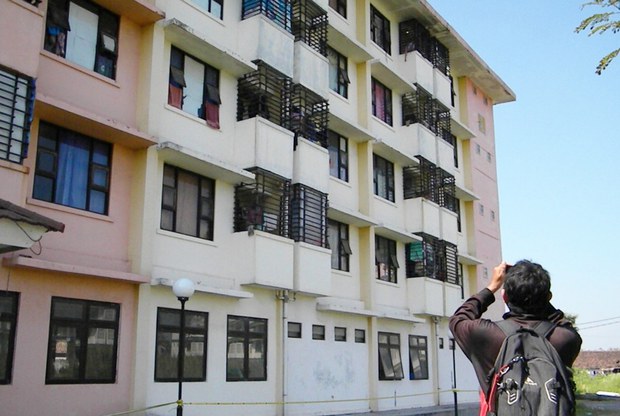Indonesian Ministry Vows to Rehabilitate Orphans of Terror Suspects
2018.06.13
Jakarta
 A journalist takes a picture of an apartment in Sidoarjo near Surabaya, Indonesia, after a bomb went off prematurely, killing a couple and one of their children, May 14, 2018.
A journalist takes a picture of an apartment in Sidoarjo near Surabaya, Indonesia, after a bomb went off prematurely, killing a couple and one of their children, May 14, 2018.
Indonesia’s Social Affairs Minister has pledged to protect and rehabilitate seven children who were orphaned when their parents were killed last month while they allegedly prepared for or were carrying out terrorist attacks in and near Surabaya, East Java.
The ministry received the children on Tuesday from East Java Provincial Police after they were flown to Jakarta.
“They have been handed over to the Ministry of Social Affairs. However we are still coordinating and doing evaluations to determine further steps,” Social Affairs Minister Idrus Marham told reporters.
Without going into detail about rehababilitation efforts, Idrus said the program would be conducted in cooperation with other relevant ministries and government agencies, such as the National Counterterrorism Agency (BNPT).
“Slowly but surely we can neutralize the doctrine of terrorism and we can fill them with teachings of the rahmatan lil alamin Islam,” he said, referring to the term “Islam as a blessing for all.”
Idrus said his office would provide protection and assistance to the children to restore their confidence before gradually erasing radical ideology taught by their parents. Officials are unsure how long the process will take.
“We would need to see development involving their physical and psychological health. The most important thing is to clean their minds completely from radical ideology,” he said.
The three boys and four girls between the ages of 4 and 15 have received medical and psychological treatment in Surabaya since their parents’ deaths.
Three of the orphans – aged 10, 11 and 15 – are children of Anton Febrianto, a suspected militant who was killed with his wife and a 17-year-old child when a bomb exploded prematurely in an apartment in Sidoarjo, near Surabaya, on May 13.
Three others are children of suspected militant Dedy Sulistianto, who was shot dead by police in a raid in Surabaya on May 15. Dedy is Anton’s younger brother.
The last child, a 7-year-old girl, survived a suicide attack on May 14 at a police checkpoint in Surabaya that killed her parents and two brothers.
Also on May 13, a family of six, including children carried out suicide bombings targeting three churches in Surabaya, Indonesia’s second largest city. All six family members were killed along with 12 other people.
‘Good and proper’
Idrus said the orphans in his ministry’s care were in a “good and proper” place, but refused to identify the location for their privacy and safety.
“I am convinced after two or three days to adapt accompanied by educative mentoring, they can feel at home in the place we provided,” he said.
The ministry has provided care for 81 children tied to terrorism, he added.
“We will evaluate. We cannot implement the program rigidly. We have to be flexible because it is a matter of ideology and religious understanding that we have to deal with seriously,” he said.
“When we are confident that they are clean from radical ideology, then we can take the next step.”
Ministry staffer Neneng Heriyani said the children’s first day at the rehabilitation center went well.
“They are adjusting to a new environment,” he told BenarNews on Wednesday, adding they were accompanied by grandmothers and other family members.
Any Rufaidah, a researcher with the Jakarta-based University of Indonesia’s Center for Research and Police Science, said the effort to put children into the rehabilitation center was proper because they needed to be removed from their home environment.
“The presence of the state is important. But it must be ensured that the Ministry of Social Affairs has a clear platform on how to help these children and there should be an assessment of each individual,” she said.
She said the children needed supervision.
“Their interactions should be monitored at the first stage. Once it is confirmed they would not negatively influence others, let them interact as this becomes an important part of understanding the differences with other people,” Any said.
Terror trials
Meanwhile last week, the country’s broadcasting commission released a statement instructing television, radio networks and others to refrain from airing terrorist trials live, Indonesian media reported.
In May, a national police spokesman said ongoing coverage of terror trials could raise sympathy from supporters and turn a suspected terrorist into a role model, according to an article published Monday by the Jakarta Post.
It noted that the statement came three days after the trial of Aman Abdurrahman, who is accused of masterminding terror attacks by Islamic State followers that killed nine people, including a 2-year-old girl, in 2016 and 2017, was delayed briefly following explosion-like sounds.
Judges in the South Jakarta District Court are to decide Aman’s fate on June 22.







